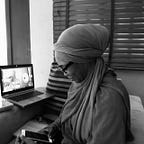HELMETS AND HIJABS — THE INTRICACIES OF CYCLING FOR MUSLIM WOMEN
As a little girl, I never really thought about the reason my parents allowed my brothers to cycle and not me. It was as simple as ‘Maybe it’s just not something that girls do’. I only got the opportunity to ride whenever they were out of town and it never occurred to me that there were some underlying gender issues in something as easy as peddling away with your own two legs to wherever it was you wanted to go. About five years ago, I came across Arwa Aburawa’s article titled Hymens, Hijabs and Helmets: Muslimahs who cycle which opened my eyes to all the possible reasons my parents didn’t approve of me getting on the bike with my brothers.
Perhaps it was about my hymen. They were afraid that the bicycle was a threat to my virtue as a girl who would one day grow up to become a woman. Or perhaps, they were afraid that it would make me develop masculine tendencies as it just wasn’t something that my community considered “Ladylike” or were they aware of the potential long-term effects it had in making me develop an independent and self-sufficient personality. This seemed to be more accurate considering that all you needed were those two wheels to take you anywhere you wanted without worrying about having to buy fuel; a symbol of freedom and liberation. They wouldn’t want me to develop a long-term attachment to those pair of wheels for fear that no man would consider me feminine enough to want to marry me. It wasn’t enough that I was making all these excuses for them because to me, none of these reasons held any weight.
So I found myself asking my mum one evening what exactly was wrong with a woman cycling. It didn’t come to me as a surprise when she gave me her usual cliché answer “Because it’s just not something that women do”.
“Says who?” I asked, peering into her eyes. She gave me a look that expressed how surprised she was at my guts
“Are you interrogating me?”
“No. I’m just asking.”
She was silent, feeling quite uncomfortable about the potential destination of this conversation. She asked me why I had suddenly developed an interest in cycling as a young Muslim woman who at that time had begun to wear the hijab. Then I listed the many benefits of cycling telling her how it is the greenest means of transportation, producing absolutely zero carbon emissions, how it would help me to keep fit and healthy and how cheap it was, especially if you wanted to get somewhere on time and not need to worry about fueling your car. I saw her nodding as if she had been enlightened by the little explanation I gave to her. Finally she said “That still does not make it appropriate for you to cycle. In this part of the world, it’s not something women do. At least not in public. What if you get injured? How do you want people to look at you, a young woman in Hijab peddling away on the wheels of a bike; a very immodest thing to do”. As corny as it sounds, I realized that it all boiled down to cultural barrier. Wasn’t it both amusing and ridiculous that something as simple as a bicycle could hold that much significance when it came to the virtue of women. I finally said to myself, I’m going to buy a good bicycle someday and I’m going to start cycling.
One cool evening, while I was far away working in the North western part of the country in a predominantly Muslim environment, I told my roommate Maryam, that I would love to cycle around town. She immediately bought into the idea and went into the neighbourhood to borrow two bikes from the guys around. We got into our wide-legged joggers and trainers and mounted the wheels with our Hijabs on. On getting to the street, something strange happened. Almost the entire neighbourhood, men, women and children had come out, all staring us disapprovingly, some of them wagging the ‘no’ finger while the children made a mockery of the scene, singing and clapping to native songs to jeer us back into our house. Maryam and I had retreated. We were never going to get a chance to cycle.
The heart of this experience is something Muslim women in other parts of the world are going to be able to relate to, which is the idea of being labeled deviant or rebellious for wanting to do something outside of what is considered traditionally permissible. So, the fear of being labeled an outcast puts women in check; whether it is in jogging down the street, playing basketball or like me, mounting a pair of wheels. My conviction had not changed. This had more to do with predominant cultural practices and so little to do with Islam. Attitudes towards Muslim women on bikes are diverse. While it is so much frowned upon in West Africa and in the Middle Eastern countries, the sight of a Muslim woman on a bike in the West and in some south Asian countries doesn’t in the least stir anyone’s interest.
So one day, when my children are old enough to cycle, I’m going to put on my hijab and helmet, get on the bike too and cycle around town with them. For I would love to once again challenge the social and cultural barrier that is at the center of why so many Muslim women are unable to cycle. And I would definitely not be giving up without a fight this time.
